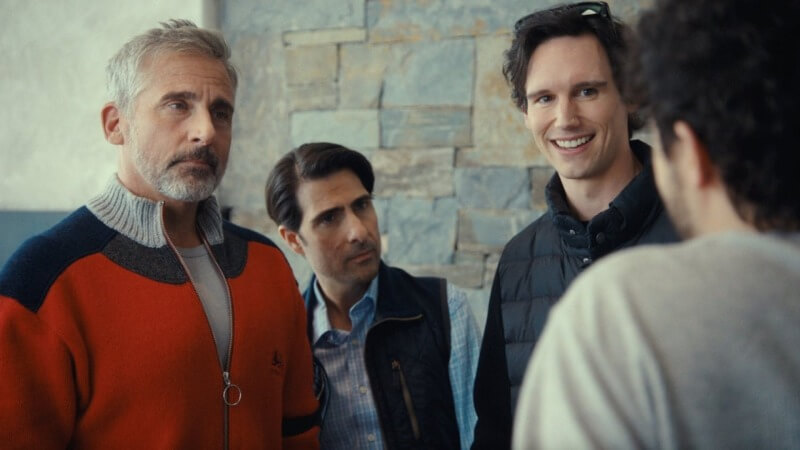In Mountainhead, Jesse Armstrong Asks If We Can Ever Truly Relate to Billionaires

In a scene early on in Mountainhead, which was released on Max at the beginning of the month, four tech bro billionaires (well, technically three billionaires, and one mere mega-millionaire) stand at the top of a mountain vista and scrawl their net worths on their chests in red lipstick. Then, they holler a mixture of jargony nonsense and personal desires off what feels like the edge of the world, or at least, the edge of their world. The point being: these people are ridiculous. That they have so much power over a world full of people that they can’t begin to understand is even more ridiculous, and also very frightening.
Class satire is a popular topic. It’s been pointed out that many recent films that take aim at class, wealth, or ultra-rich people—for example, The Menu, Triangle of Sadness, or Saltburn—are often broad in their commentary, vaguely gesturing towards something relating to class and its ironies and injustices without really saying anything at all. Compare any of the aforementioned films to something like Parasite, which is so sharp and clear in how it pokes at the boundaries of wealth and literalizes the systemic suffering those boundaries create.
Jesse Armstrong, in Succession and again in Mountainhead, seems less interested in the divides of class and more interested in extremely wealthy people as individuals, exploring how such obscene wealth creates certain psychological trappings and distortions in those who hold it. The billionaires of Succession and Mountainhead aren’t just out of touch, they are so out of touch that they cannot conceive of an entire world full of other humans.
Mountainhead presents the most literal explanation of that idea when one character point blank asks another: “Do you believe in other people?” On the nose? Maybe. But by laying out its terms as quickly and obviously as possible, Mountainhead can then spend most of its runtime watching its despicable characters stew in their own ridiculousness. There is no growth or change for the characters of Mountainhead. That’s the whole point—even a global crisis does nothing to shake the metaphorical and literal mansion on a mountaintop where the billionaires live.
-

-

-

-

-

-

-

-

-

-

-

-

-

-

-

-

-

-

-

-

-

-

-

-

-

-

-

-

-

-

-

-

-

-

-

-

-

-

-

-








































